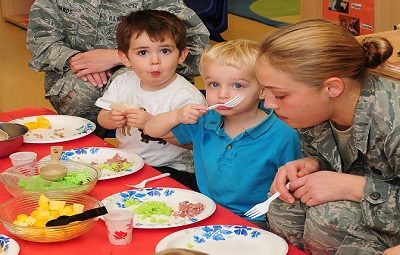Your work with military families can be rewarding, especially when they share information with you that’s useful for getting them the help they need. Military families don’t always share information freely, because they are told not to share personal details—or even the fact that they are a military family. This is because of Operational Security, often referred to as OPSEC. This article explains the ways OPSEC may limit what a military family can share, and how you can build trust with military families. Oh yes, and it explains the ham!
Military family members are advised to protect information that can be used against the military mission, service members, and their families. They’re told to use OPSEC when making choices about what communications to use, what they say in emails or on the phone and postings on social networking sites. This may create hesitation for military parents looking for help for their child in the civilian community. Since OPSEC’s definition is broad it’s hard to tell what families are allowed to share.
To understand just how thorough OPSEC can be, we’re sharing a short poem, “OPSEC and Ham” (obtained from the spouse of a service member, and with apologies to Dr. Seuss!):
Download the verse as a Word document
Trust is important to all of us. Awareness of the degree to which military families maintain operational security helps you understand their situation. If you work from this place of understanding with military families, it may enhance and build trust.
Let them know you’re aware there are certain types of information they can’t give you. Explain that if you ask anything during a conversation, it’s to understand their situation and help them. Tell them how your Parent Center ensures confidentiality but realize that they may still not wish to disclose certain information.
When you show your awareness of aspects of military life, it can create a climate where trust is possible. You already have something in common: raising a child with, or personal experience with disabilities. We all know that trust is valuable in relationships– we hope it reinforces yours with military families.
In conclusion:
- Do tell military parents you understand there is information they may not be able to share with you, such as deployments, the nature of the person’s work and/or their career with the military.
- Do share how you and your center ensure confidentiality.
- Ask the questions you need to help the family and realize they may not be comfortable sharing for operational security reasons. You can affirm they have your permission to let you know if you ask something they cannot answer.
- Do share if you have any personal connection with the military to help build rapport.
- Do continue your ongoing professional development by enhancing your knowledge about military culture, language and systems.
- Above all, military families want to help their child with disabilities and we know they are in good hands with our parent centers!
The Branch staff stands ready to help you with any support you are providing. From a complicated one-to-one support situation involving a military family, to how to provide training to military families connected with a branch of service or nearby installation, to how your parent center can be more connected in serving military families. Check out your State’s Branch representative on the home page of our website, branchta.org

